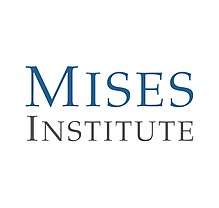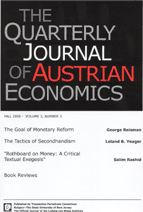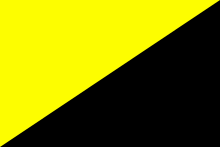Mises Institute
The Ludwig von Mises Institute for Austrian Economics, or Mises Institute, is a nonprofit think-tank located in Auburn, Alabama, United States.[3] It is named after Austrian School economist Ludwig von Mises (1881–1973).
 | |
| Founder(s) | Lew Rockwell, Murray Rothbard, Burton Blumert, Henry Hazlitt |
|---|---|
| Established | 1982 |
| Focus | Economics education, Austrian economics, libertarianism |
| Faculty | 350+[1] |
| Staff | 21 |
| Key people | Lew Rockwell (Chairman) Jeff Deist (President) Joseph Salerno (Editor Quarterly Journal of Austrian Economics) |
| Budget | Revenue: $4,200,056 Expenses: $4,165,289 (FYE 2017)[2] |
| Location | , , United States |
| Website | mises |
| Part of a series on the |
| Austrian School |
|---|
|
Organizations |
|
People
|
|
Related topics
|
|
|
The Mises Institute was founded in 1982 by Lew Rockwell, Burton Blumert, and Murray Rothbard, following a split between the Cato Institute and Rothbard, who had been one of the founders of the Cato Institute, and was funded by Ron Paul.[4]
Background and location

- Further information: Split among the contemporary Austrian School
The Ludwig von Mises Institute was established in 1982 in the wake of a dispute which occurred in the early 1980s between Murray Rothbard and the Cato Institute, another libertarian organization co-founded by Rothbard.
Early after its founding, the Mises Institute was located at the business department offices of Auburn University, and relocated nearby to its current site in 1998. "Southerners have always been distrustful of government," making the South a "natural home" for the organization's libertarian outlook.[4]
Views espoused by founders and organization scholars
In a 2006 article published on the Wall Street Journal's website, Kyle Wingfield credited the Institute for helping make the "Heart of Dixie a wellspring of sensible economic thinking."[5]
The Institute is founded in Misesian praxeology ('the logic of action'), that holds that economic science is a deductive science rather than an empirical science. Developed by Ludwig von Mises, following the Methodenstreit opened by Carl Menger, it is a self-conscious opposition to the mathematical modeling and hypothesis-testing used to justify knowledge in neoclassical economics. Externally, this economic method usually is considered a form of heterodox economics.[6]
American Civil War and the Confederacy
A 2000 "Intelligence Report" by the Southern Poverty Law Center, categorized the Institute as Neo-Confederate, "devoted to a radical libertarian view of government and economics."[7]
Publications, conferences, activities and awards

The Mises Institute makes available a large number of books, journal articles, and other writings online, and archives various writings on its website. Its Quarterly Journal of Austrian Economics discusses Austrian economics. It published the Journal of Libertarian Studies from 1977 to 2008.
Notable scholars
Noted scholars include:[8]
- Walter Block – Austrian School economist and anarcho-capitalist; economics professor at Loyola University New Orleans
- Thomas DiLorenzo – economics professor at Loyola University Maryland
- Paul Gottfried – Former Professor of Humanities at Elizabethtown College
- Hans-Hermann Hoppe – philosopher, paleolibertarian, business professor at University of Nevada, Las Vegas, and founder of Property and Freedom Society
- Jesus Huerta de Soto – Professor of Applied Economics at King Juan Carlos University
- Peter Klein – Professor of Entrepreneurship and Senior Research Fellow with the Center for Entrepreneurship & Free Enterprise at Baylor University[9]
- Robert P. Murphy – economist, Institute for Energy Research
- Andrew Napolitano – Fox News pundit and former judge
- Gary North – co-founder of Christian Reconstructionism and founder of Institute for Christian economics
- Ron Paul – physician, author, and former congressman
- Ralph Raico (1936–2016) – historian and libertarian specializing in European classical liberalism and Austrian economics
- Murray Rothbard (1926–1995) – heterodox economist, paleolibertarian theorist, polemicist, revisionist historian, and founder of anarcho-capitalism
- Joseph Sobran (1946–2010) – journalist, contributor to American Renaissance and lecturer at the Institute for Historical Review
- Mark Thornton – Austrian School economist[10]
- Joseph T. Salerno – Academic vice president of the Mises Institute, professor of economics at Pace University, and editor of the Quarterly Journal of Austrian Economics.
- Thomas Woods – historian, political analyst, and author
Criticisms
The Mises Institute has been criticized by some libertarians for the adoption of paleolibertarian and right-wing cultural views by some of its leading figures, on topics such as race, immigration, and the presidential campaign of Donald Trump.[11]
In 2003, Chip Berlet of the Southern Poverty Law Center (SPLC), an American nonprofit legal advocacy organization specializing in civil rights and public interest litigation, described the Mises Institute as "a major center promoting libertarian political theory and the Austrian School of free market economics", also noting Rothbard's opposition to child labor laws and the anti-immigrant views of other Institute scholars.[12]
See also
References
- "Mises Academy:What Is The Mises Institute; What We Do". June 18, 2014.
- "Mises Institute in Charity Navigator". Charity Navigator. Retrieved June 5, 2019.
- Sam Tanenhaus and Jim Rutenberg (January 25, 2014). "Rand Paul's Mixed Inheritance". New York Times. Retrieved February 20, 2014.
- Wingfield, Kyle. "Auburnomics: Von Mises finds a sweet home in Alabama." Wall Street Journal. August 11, 2006.
- Wingfield, Kyle (August 4, 2006). "Sweet Home Alabama." The Wall Street Journal Online
- Lee, Frederic S.; Cronin, Bruce C.; McConnell, Scott; Dean, Erik (2010). "Research Quality Rankings of Heterodox Economic Journals in a Contested Discipline". American Journal of Economics and Sociology. 69 (5): 1409–1452. doi:10.1111/j.1536-7150.2010.00751.x.
- "The Neo-Confederates". Intelligence Report. Southern Poverty Law Center. Summer 2000.
- "Faculty Members" Ludwig von Mises Institute
- Peter Klein, Baylor University's Hankamer School of Business. Retrieved 22 December 2017
- "Senior Fellows, Faculty Members, and Staff." Ludwig von Mises Institute
- Paul Disowns Extremists’ Views but Doesn’t Disavow the Support. New York Times
- Berlet, Chip (Summer 2003). "Into the Mainstream". Intelligence Report. Southern Poverty Law Center. Retrieved September 24, 2013.
External links
| Wikimedia Commons has media related to Mises Institute. |
- Official website
- EDIRC listing (provided by RePEc)
